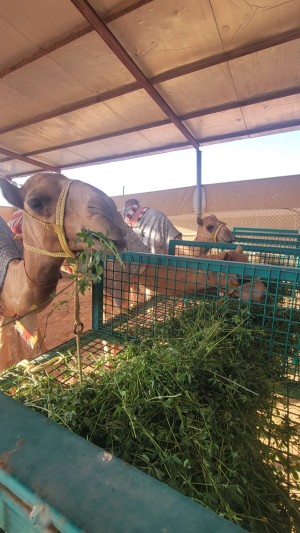
The Role of Nutrition in Camel Racing Success
Camel racing is a highly competitive sport requiring camels to perform at their physical peak. Proper nutrition plays a fundamental role in the success of camel racing, significantly influencing their health, performance, and endurance. Camels are extraordinary animals with unique physiological adaptations, but even they require a carefully managed diet to meet the rigorous demands of competitive racing. A diet rich in protein is essential for muscle development, repair, and recovery. Feeds like alfalfa, legumes, and other high-protein sources are crucial for supporting the intense physical activity racing camels undergo. Additionally, energy-dense feeds, such as oats, barley, and sorghum, provide the fuel needed for sustained speed and stamina, ensuring that camels can perform at their best during high-intensity races.
Hydration is another critical factor in camel nutrition. While camels are known for their ability to survive with limited water, racing conditions demand regular and adequate hydration to prevent fatigue and overheating. Electrolyte supplements are particularly important in replenishing vital minerals such as sodium, potassium, and magnesium, which are essential for maintaining proper muscle function and avoiding cramping or dehydration. These electrolytes also help camels recover more quickly after races, keeping them in peak condition for future competitions.
To maintain overall health and resilience, racing camels require a well-rounded diet that includes essential vitamins and minerals. Vitamins A, D, and E, along with minerals like zinc, calcium, and selenium, play a vital role in strengthening the immune system, supporting bone health, and improving energy metabolism. Mineral blocks or specialized supplements can be provided to ensure these nutrients are readily available, particularly in regions where natural forage may lack the necessary nutrient content. Digestive health is another cornerstone of camel nutrition, as their ability to process fibrous roughage like hay and dry grasses ensures proper nutrient absorption and prevents gastrointestinal issues.
Feeding regimens must be tailored to match the specific needs of training and racing schedules. Before a race, camels should be given light, easily digestible meals that are rich in energy to avoid digestive discomfort while providing the fuel they need to excel. After a race, their diet should focus on protein and electrolytes to support muscle recovery and replenish lost nutrients. By carefully planning feeding schedules and dietary composition, trainers can maximize the physical potential of their racing camels while safeguarding their long-term health and well-being.
